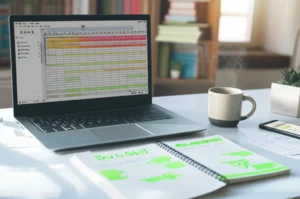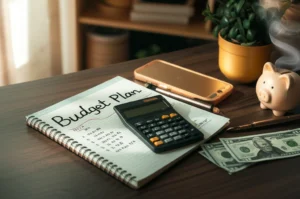Let’s skip the formalities and get right to the answer you came for: having a budget is honestly one of the most powerful tools for turning your financial goals from wishful thinking into your everyday reality. You want more savings, less stress, and a clear plan for your money—budgeting’s the trick.
Imagine if every dollar you made actually did what you wanted. No more surprise “where did my money go?” panic at the end of the month, no more feeling like you’re stuck behind while everyone else is getting ahead. That’s not just daydream material. It’s what creating (and sticking to!) a budget can do for you. Especially if you like quick answers or flashcard-style clarity (shout-out to all the Quizlet fans out there!).
Why Budgets Really Matter
So, why all this fuss about budgeting and why is everyone typing things like “how can a budget help you reach your financial goals quizlet” into Google at 2 a.m.? (Hey, no judgment… we’ve all been there, searching for answers with two windows open and snacks in hand).
Here’s the thing: financial freedom doesn’t happen by accident. It happens when you give your money a job. And that’s literally what a budget does. A solid, realistic budget helps you:
- Track your spending so you see the good, the bad, and the “I totally forgot I was still paying for that app.”
- Prioritize your goals—save up, pay off debt, finally buy those new headphones (without guilt).
- Spot patterns (like your sneaky coffee habits) so you can make better choices on where your cash goes.
- Stay motivated because, let’s be honest, seeing real progress is way more satisfying than just hoping something will change.
Budgeting Benefits You’ll Feel
Let’s break down exactly how budgets work their magic in real life, not just in textbooks or Quizlet flashcards.
Tracking—Seeing Where It All Goes
The first step to financial control is knowing what’s really happening with your money. It’s a bit like looking in the fridge before grocery shopping—you can avoid a lot of accidental double purchases (and throwing out mushy produce).
How Tracking Changes Everything
When you track your spending, you turn “I have no idea where my paycheck went” into “Okay, I spent $60 on late-night takeout last month. Maybe it’s time for more homemade dinners (or at least cheaper takeout…).” It’s almost like getting a peek behind the curtain of your own habits.
Tools for Easy Tracking
You don’t need a PhD in Excel. Try budgeting apps (there’s a ton, from free to fancy), or just a notebook. Use spreadsheets if you love seeing everything at a glance. Even how can a budget help you reach your financial goals brainly style Q&A can inspire you to jot down quick daily numbers.
Prioritizing—What Really Matters?
Now, for the gold: deciding what should be prioritized when creating a budget? It’s like ranking your to-do list but for your future happiness.
Setting Your Priorities Straight
| Priority | Why It Matters |
|---|---|
| Essentials (rent, utilities, food) | Non-negotiables. Keep the lights on, bellies fed. |
| Debt Payments | If you don’t pay, life gets a lot messier. |
| Emergency Fund | Because car repairs and surprise bills happen. Every. Time. |
| Personal Priorities (saving for a trip, new tech, etc.) | This is where you make your money work for your dreams, not just your bills. |
If Money’s Tight: Low-Income Budgeting Tips
Wondering how to budget money on low income? It’s tough, but not impossible. Focus first on essentials and small, non-negotiable savings—even if it’s just $5 a week. Cut back where it stings least (subscriptions, extra snacks, random online buys). Grab every community resource or support you can find (there’s zero shame in using what’s available).
Milestones—Aiming for Real Progress
A budget isn’t just about saying “no” to fun stuff. It’s about saying a big “YES” to the things you want most. That’s where goals turn into monthly mini-targets.
How to Turn Goals Into Steps
Let’s say you want $1,200 for an emergency fund in a year. Divide it by 12. Now you’re looking for $100 a month. Track your progress on a whiteboard, a phone app, or—if you’re like me—sticky notes all over your desk. Progress is progress.
Popular Budget Types—Pick What Fits You
Budgeting isn’t one-size-fits-all. If you try a strict spreadsheet and give up in a week, you’re not alone! Let’s talk styles—and how each helps you reach your financial goals (yep, even Quizlet would approve):
Zero-based Budgeting
With this method, every dollar gets a job. “Zero-based” means at the end of the month, all income is assigned—nothing just drifts away. You earn $2,000? Every dollar goes somewhere: bills, savings, treats, whatever. There’s something so satisfying about seeing the math add up perfectly.
Sample Zero-Based Plan
- Income: $2,000
- Necessities: $1,200
- Debt: $300
- Savings: $250
- Fun: $150
- Total: $2,000
The 50/30/20 Rule
Not a fan of tracking every snack run? Try the 50/30/20 method: 50% for needs, 30% for wants, 20% for savings or debt. It’s simple, flexible, and great for beginners.
Making It Work On Any Income
If your expenses are more than 50%, flex the ratios. Maybe it’s 70% needs, 20% wants, 10% savings for now. The magic is in starting and adjusting—not aiming for perfection.
Envelope (Cash) Budgeting
Sometimes good, old-fashioned cash works best. Put cash for groceries in one envelope, entertainment in another, etc. When it’s gone, you’re done spending in that category. It’s old school—and surprisingly effective for curbing those “do I really need this?” impulse buys.
Step-by-Step: Building a Budget That Works
If you’ve made it this far, you’re serious about making a change, so let’s put the steps in your hands:
Step 1 — Set Your Real Goals
Think about what you want your money to do for you. Tiny or huge. Save $500 for emergencies? Pay off $5,000 of student loans? Dream of a Paris trip? Write them down, even if they sound wild. This is your “why.”
Friendly tip: Answer quiz-style questions like “What can a budget help you do? Select a response.” It helps lock things in your memory!
Step 2 — Get Real About Income & Expenses
Time for the “ugh” part—dig through your bank statements (grab coffee, I’ll wait) and see what’s really coming in, and where it’s really going out. List out absolutely everything—rent, bills, snacks, gifts, you name it.
Step 3 — Give Every Dollar a Job
This part is powerful. The first dollars should hit urgent needs and debts, then nudge something into savings—even if it feels tiny. You’re building momentum.
A low-income scenario? Maybe $1,800 comes in. Rent and bills get $1,200, food is $300, $100 to loans, $50 to savings, $150 stays flexible. Adjust the ratios as life shifts.
Step 4 — Track, Review, and Adjust
Check your budget every week or month. See what’s working, what isn’t, and edit as needed. Life changes—so should your budget. If you find $10 extra one month, toss it toward your main goal!
Step 5 — Make It Easy On Yourself
Set up auto-transfers so savings happen before you can “accidentally” spend it. Use alerts and apps. The easier it is, the more likely you’ll stick with it.
Budgeting on Low Income—Stay Hopeful
Can a budget really work for someone with a small paycheck? Absolutely. Plenty of amazing people make progress on $2,000 or less a month. Focus on needs, find little ways to save or earn extra, and celebrate every win—no matter how tiny.
You can also find supportive walkthroughs and practical examples at how can a budget help you reach your financial goals everfi. Useful, isn’t it?
How Budgets Help—Quizlet and Beyond
At the end of the day, a lot of us just want clear, no-fluff answers: what can a budget help you do? Let’s keep it simple:
- Give you control over your money (no more nasty “where did it all go?” feeling).
- Help you pay down debt (bye, interest!).
- Make saving feel doable (even if it starts small).
- Prepare for big purchases, emergencies, and moments that matter.
- Stop overdraft and late fees in their tracks!
For more insights on education-friendly budgeting, don’t forget the how can a budget help you reach your financial goals brainly page. Sometimes, another perspective just makes things click.
Stories, Real Examples, and Encouragement
Let me get real for a second. A couple of years back, I thought budgeting was only for “other people”—the ones who always packed their lunch and never missed a bill. But then came a surprise vet bill (my dog is adorable, but also accident-prone). My “budget” at the time was a stack of receipts in a desk drawer.
I started taking budgeting seriously, tracked expenses, and set a tiny emergency savings goal. Within four months, I had enough set aside for the next surprise. And my stress went down—big time! Seeing the numbers move, even slowly, is one of the most confidence-boosting feelings out there.
You can find stories like paying off credit card debt, saving for a dream trip, or just feeling “on top” of money after years of chaos in communities everywhere. The first steps are honestly the scariest. You’re not alone!
Making It Stick: Tools & Tips
Flashcards aren’t just for test days. Jot down key budgeting terms and stick them on your fridge, bathroom mirror, or as reminders on your phone. What’s zero-based budgeting? Giving every dollar a job—easy. What should be prioritized? Essentials, debt, and an emergency fund—let that sink in.
Budgeting apps, simple spreadsheets, or even envelopes with cash for each category—pick what fits your vibe. The right system is always the one you’ll keep using.
Budgeting Isn’t Magic—Know The Limits
One last thing: budgets don’t fix everything. Sometimes life throws a curveball. Unexpected job loss, medical bills, market crashes—they’re rough, and even the best budget can’t prevent every financial storm.
Give yourself grace. If an expense blows your plan up, reset and try again. Every budget needs to bend and flex as your life changes. That’s not failure—it’s wisdom.
Wrapping Up: Your Path Starts Now
If you’ve made it this far, you’re already ahead of the game. A budget is more than a spreadsheet; it’s a promise to yourself to make money less stressful and your life more intentional. Whether you’re after a debt-free milestone, finally building that emergency fund, or just taking the mystery out of your paycheck, budgeting brings it all within reach.
Remember, you don’t need fancy tools or big income to get started. Pick one goal, run a one-month spending check, and test a simple budget style, like zero-based or 50/30/20. Want to see more examples? Check out how can a budget help you reach your financial goals brainly or browse how can a budget help you reach your financial goals everfi.
You got this. Start today, tweak as you go, and give yourself credit for every step. What’s one thing you could do to take charge of your money this week? If you’re stuck, curious, or just want to share your budget victories, I’m rooting for you!













